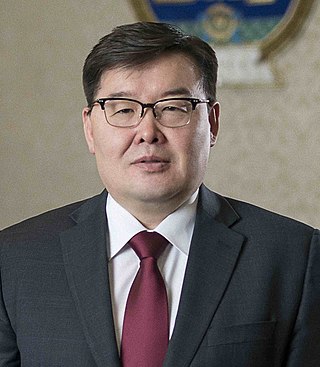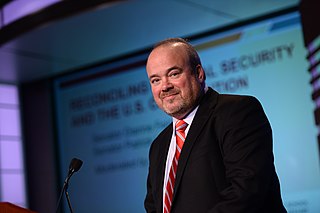
Direct democracy or pure democracy is a form of democracy in which the electorate decides on policy initiatives without elected representatives as proxies. This differs from the majority of currently established democracies, which are representative democracies. The theory and practice of direct democracy and participation as its common characteristic was the core of work of many theorists, philosophers, politicians, and social critics, among whom the most important are Jean Jacques Rousseau, John Stuart Mill, and G.D.H. Cole.
Deliberative democracy or discursive democracy is a form of democracy in which deliberation is central to decision-making. It often adopts elements of both consensus decision-making and majority rule. Deliberative democracy differs from traditional democratic theory in that authentic deliberation, not mere voting, is the primary source of legitimacy for the law. Deliberative democracy is closely related to consultative democracy, in which public consultation with citizens is central to democratic processes.
Participatory democracy, participant democracy or participative democracy is a form of government in which citizens participate individually and directly in political decisions and policies that affect their lives, rather than through elected representatives. Elements of direct and representative democracy are combined in this model.

Science and technology studies (STS) or science, technology, and society is an interdisciplinary field that examines the creation, development, and consequences of science and technology in their historical, cultural, and social contexts.
A deliberative opinion poll, sometimes called a deliberative poll, is a form of opinion poll taken before and after significant deliberation. Professor James S. Fishkin of Stanford University first described the concept in 1988. The typical deliberative opinion poll takes a random, representative sample of citizens and engages them in deliberation on current issues or proposed policy changes through small-group discussions and conversations with competing experts to create more informed and reflective public opinion. In 2021, Fishkin suggested deliberative polls could be run virtually to reduce costs. Deliberative polls have been run around the world, including in the United States and China.
Radical democracy is a type of democracy that advocates the radical extension of equality and liberty. Radical democracy is concerned with a radical extension of equality and freedom, following the idea that democracy is an unfinished, inclusive, continuous and reflexive process.
Power 2010 was a campaign to reform the Parliament of the United Kingdom.

Gombojav Zandanshatar or Zandanshatar Gombojav is a prominent Mongolian politician. He is a member of the Mongolian People's Party, and has served as Party General Secretary in 2012-2013.
A citizens' assembly brings together an inclusive group of lay citizens to deliberate on important public questions so as to exert an influence. Some of the variations include citizens' jury, citizens' panel, people's panel, mini-publics,people's jury, policy jury, citizens' initiative review, consensus conference and citizens' convention.
Deliberation Day is a proposed holiday promoting deliberative democracy. The proposal was suggested by American political scientists Bruce Ackerman and James Fishkin and would supplement or replace Presidents' Day in the United States. On Deliberation Day, all registered voters would be invited to participate in public community discussions about the upcoming elections, and would be given financial compensation for their involvement in order to encourage the participation of those who are less interested in politics.

Jane Jebb Mansbridge is an American political scientist. She is the Charles F. Adams Professor of Political Leadership and Democratic Values in the Kennedy School of Government at Harvard University.
Online deliberation is a broad term used to describe many forms of non-institutional, institutional and experimental online discussions. The term also describes the emerging field of practice and research related to the design, implementation and study of deliberative processes that rely on the use of electronic information and communications technologies (ICT).
The Jane Mansbridge bibliography includes books, book chapters and journal articles by Jane Mansbridge, the Charles F. Adams Professor of Political Leadership and Democratic Values, Kennedy School of Government, Harvard University.
Tali Mendelberg is the John Work Garrett Professor in Politics at Princeton University, and winner of the American Political Science Association (APSA), 2002 Woodrow Wilson Foundation Book Award for her book, The Race Card: Campaign Strategy, Implicit Messages, and the Norm of Equality.
Cristina Lafont is Harold H. and Virginia Anderson Professor of Philosophy at Northwestern University.
Epistemic democracy refers to a range of views in political science and philosophy which see the value of democracy as based, at least in part, on its ability to make good or correct decisions. Epistemic democrats believe that the legitimacy or justification of democratic government should not be exclusively based on the intrinsic value of its procedures and how they embody or express values such as fairness, equality, or freedom. Instead, they claim that a political system based on political equality can be expected to make good political decisions, and possibly decisions better than any alternative form of government .

Lawrence R. Jacobs is an American political scientist and founder and director of the Center for the Study of Politics and Governance (CSPG) at the University of Minnesota. He was appointed the Walter F. and Joan Mondale Chair for Political Studies at the University of Minnesota's Humphrey School of Public Affairs in 2005 and holds the McKnight Presidential Chair. Jacobs has written or edited, alone or collaboratively, 17 books and over 100 scholarly articles in addition to numerous reports and media essays on American democracy, national and Minnesota elections, political communications, health care reform, and economic inequality. His latest book is Democracy Under Fire: Donald Trump and the Breaking of American History. In 2020, he was elected a Fellow of the American Academy of Arts and Sciences.

America in One Room was a 2019 event that assembled the largest representative sample of the American voting electorate in history to discuss polarizing political issues. It utilized a method called deliberative polling, led by Stanford Professors James Fishkin and Larry Diamond of the Center for Deliberative Democracy. The event was funded and operated by Helena, an organization that implements projects to address global challenges.
The Global Assembly is a global citizens' assembly consisting of one hundred persons from around the world chosen by sortition to discuss issues facing the world as a whole, starting with climate change. It is a joint initiative of several bodies including the Iswe Foundation, Danish Board of Technology, and the Centre for Deliberative Democracy and Global Governance at the University of Canberra and has multiple funders including the Scottish Government and the European Climate Foundation and is supported by the United Nations. On 30 October 2021, the Assembly produced the first statement that has any claim to democratically represent the voice of humanity in the form of an interim statement.
Mongolia's Law on Deliberative Polling is a law that codified the deliberative polling process into Mongolian law. It was ratified on February 9, 2017. It requires deliberative polling on potential amendments to the Mongolian Constitution before they are considered by parliament. It is the first ever instance of a country incorporating deliberative polling into its national law.






